9+ Sample Event Management Scope of Work
-
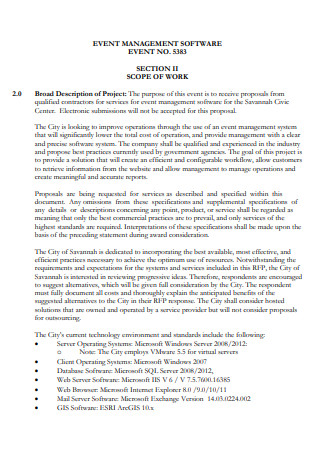
Event Management Software Scope of Work
download now -
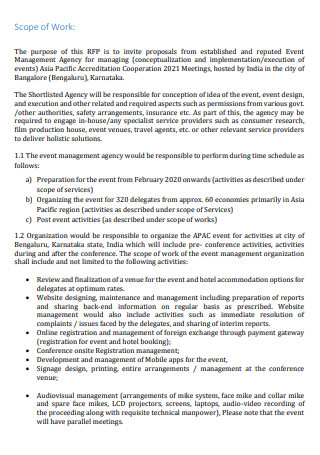
Basic Event Management Scope of Work
download now -
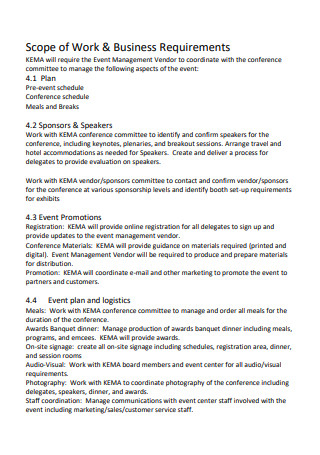
Event Management Vendor Scope of Work
download now -
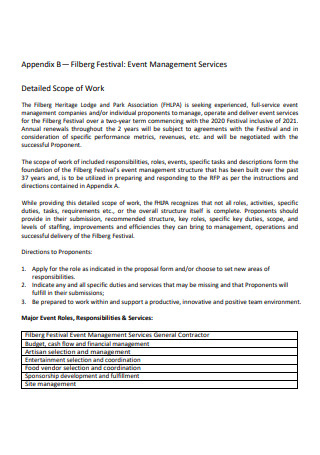
Event Management Services Scope of Work
download now -
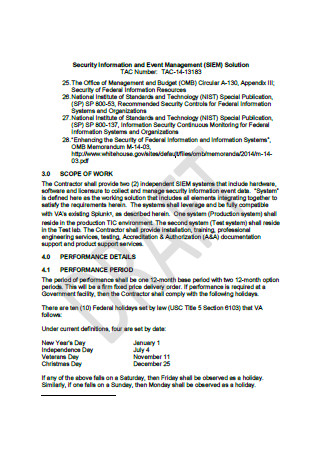
Draft Event Management Scope of Work
download now -
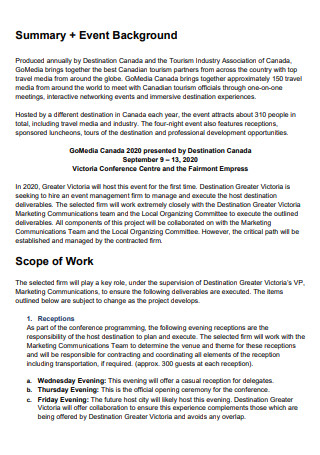
Project and Event Management Services Scope of Work
download now -
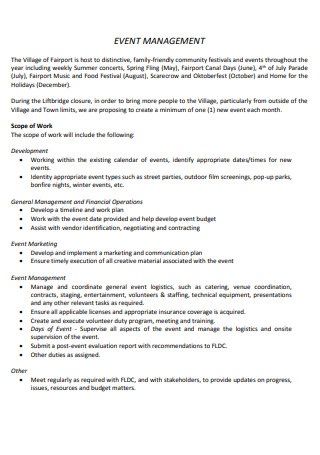
Event Management Scope of Work in PDF
download now -
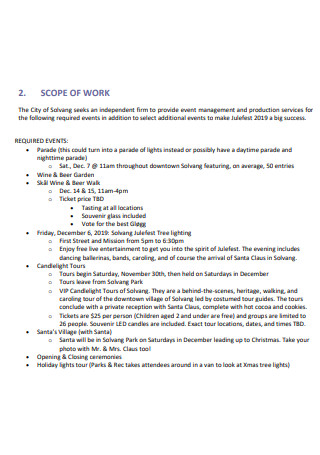
Standard Event Management Scope of Work
download now -
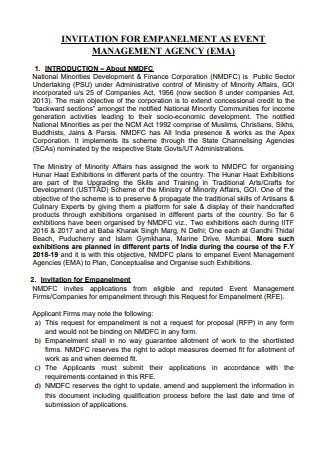
Event Management Agency Scope of Work
download now -
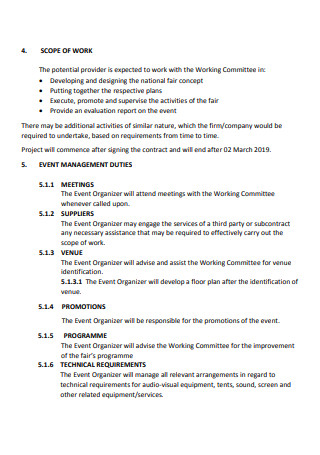
Event Management Scope of Work Example
download now
FREE Event Management Scope of Work s to Download
9+ Sample Event Management Scope of Work
What is an Event Management Scope of Work?
Different Types of Event Management Services
Benefits of Using an Event Management Scope of Work
Basic Elements of an Event Management Scope of Work
How to Create an Event Management Scope of Work
FAQs
What are some examples of event management scope of work?
What is the difference
What are the different types of event management services?
What are the key elements in an event management scope of work that should be included?
What are the duties and responsibilities of an event manager?
What are the fundamental benefits of using an event management scope of work?
What is an Event Management Scope of Work?
An event management scope of work is a brief and well-structured document that contains a cohesive description on the development of a particular event project under a specific contract. It presents all dominant facets of the event management project which includes several event design and planning reports, deliverables, milestones, end products, and many others. This document acts as a valuable guide so that both the event manager and the prospective client have sufficient information and insight concerning the overall management and design process of the events such as cultural events and festivals, corporate events, training and seminars, etc.
According to a report, networking is the most effective strategy for event managers and planners to look for new clients (66%), followed by social media (45%). Thus, all kinds of event organizers, corporate event managers, special event planners, and other key individuals in an event management and planning business should effectively create a compelling event management scope of work for the constant flow and efficient execution of their events.
Different Types of Event Management Services
Philip Berners wrote in The Practical Guide to Managing Event Venues that it is worthwhile searching for venues that have experience of hosting the type of event one is searching to take place. But, several clients actively avoid venues that have been used for the type of event they are searching to take place. That’s why a venue manager must be smart not to oversell previous events which can put clients off. Here we will explain to you about the different types of event management services below:
1. Personal Event Management
Adequate time, effort, and dedication are required when you want to organize an event for your personal work successfully. You have to select various types of menus, venue booking, guest lists, decor design and many more. There are companies that focus on organizing and planning personal events for their clients. In the past, they only dealt with indoor events but these days, they will manage outdoor events as well. If you are an event manager in a personal event management company, consider the beautiful patterns, colors, lighting effects, spectacular backdrops and many other crucial elements when it comes to arranging a magnificent party.
2. Corporate Event Management
The book Events Management: An Introduction stated that corporate events are broad as it can encompass many other types of events, which often have relationships with corporations without having similar strategic objectives because events are aimed at business. For instance, several events are distinguished as essential corporate events by the significance and size of the corporate sponsorship, branding and hospitality on offer. There are internal and external factors which influence the growth of corporate events such as increasing corporate visibility, improving staff morale, globalization of markets, and technological advances. Some large companies are employing in-house event managers as well as the majority outsourcing event design and production to contractors in order to plan and execute events within the mainstream of their activities.
3. Conference and Venue Sourcing Services
Does your client need a unique conference? By using state-of-the-art programming of the contents and logistics planning such as partner and social activities, audio and visual needs management, and engagement of guest speakers and facilitators with creative script writings, you can arrange a unique and engaging conference for your client, especially driving the interest of their attendees in the event. Also, a recent report indicated that mid-tier properties are the most popular venue type for 2021, with eventprofs indicating that 37% of events this year will take place in that property type, followed by nontraditional meeting facilities at 16.8% due to the COVID-19 pandemic.
4. Professional Workshops or Seminars Training
Professional development workshops are made to provide support to the implementation of certain procedures, strategies, or activities to boost student ethical and character development. On the other hand, skills training, quality training, team training, managerial training, safety training, and many others are some of the common training programs that companies and organizations can offer for employees. Managing a successful workshop or training is vital in facilitating order and harmony during the event.
Benefits of Using an Event Management Scope of Work
A 2020 report said that 45.9% of planners rely on in-house production for the production aspect of their virtual events, while 32.5% are outsourcing this aspect to external production companies and 21.6% rely on their virtual event tech providers. Due to the rise of technology and its application in events management, it helps event managers and planners to save time, allows focus on the event, quantifies your success, and more. To fully strengthen your determination and effort in managing events, know more about the benefits of using a scope of work for an event management:
1. Highlights the Strengths
You and your event management or planning team will be able to highlight your strengths in designing organized and visually-aesthetic events while using a good event management scope of work. Focus on the areas of the event as well as the major concerns in the planned event such as the overall design, development, and execution. So, write down your mission and vision into the paper through effective event management and planning.
2. Allows Event Success
Through a systematic event management scope of work, event managers, set designers, event decorators, and other key individuals in an event planning team are able to record sufficient data and monitor the integral elements of the event. Thus, using a simple and cohesive scope of work will allow event success.
3. Clear Communication and Delegation
Providing clarity to the assigned roles and responsibilities of the people inside your event management team is important to the smooth execution of the planned event. Using a scope of work for event management will help you in communicating and delegating the essential tasks and processes that must be done by the professional based on the requirements of the events and the competencies of the person. Additionally, it can assist you in keeping track and managing new event planning developments which can be useful when the events require urgent adjustments.
Basic Elements of an Event Management Scope of Work
In this section, you will learn how to construct an exceptionally-written and comprehensive event management scope of work. However, an event management scope of work has different elements. Include the following elements for you to create a profound piece of writing:
How to Create an Event Management Scope of Work
While creating a clear and structured event management scope of work, it should be organized and engaging which will give you an effective framework in mapping out the critical tasks, designing and management methods and other factors that may affect a particular event production. Below are some easy-to-follow tips that indicate how to create a clear and systematic event management scope of work:
Step 1: Write a Clear Overview of the Planned Event
The first step in writing an event management scope of work is writing a clear overview of the planned event or basically, creating a scope statement which outlines the overall event management plan. This section contains a wide spectrum of event deliverables and their special features.
Step 2: Establish Solid Goals and Measurable Objectives
What are the important steps you need to do in order to fulfill your event planning and management goals? Which initiatives are most urgent? Establish solid goals and measurable objectives to help you in executing your event planning and management goals and initiatives. Check the anticipated results and shorter routes to achieve event goals.
Step 3: Describe the Scope of the Event Plan
Your event plan’s executive summary should provide some sufficient information or descriptions of all valuable processes and methods crucial in the execution of the event. Include the significant milestones, program with anticipated timeframes of delivered tasks, reports, pricing, schedule, entirety of outputs, conclusions and benefits, as well as other notable elements that must be completed.
Step 4: Develop a Systematic Plan
After describing the scope of the event plan, develop a cohesive and systematic plan for your event. In this phase, it will allow you to determine where to focus and analyze the progress of your event project, as well as facilitating the accomplishment of event planning and management goals, vision and mission.
Step 5: Review and Execute the Plan
Carefully review your overall event planning and management plan for the given project and ascertain to fully include all the essential aspects in your scope of work. If you notice that you overlook some sections that require additional points, we recommend that you edit and revise the document. After the proofreading and revision stage, you can now finally execute the event management plan.
FAQs
What are some examples of event management scope of work?
Some examples of event management scope of work are event management software scope of work, basic event management scope of work, event management agency scope of work, and project and event management services scope of work.
What is the difference between a scope of work and terms of reference?
Both of these documents typically refer to the same thing. However, a scope of work is commonly embedded in an agreement as it demonstrates the basic process in the completion of the project goals. On the other hand, terms of reference is a description which contains the purpose and structures of a committee, meeting, project, or part of a project.
What are the different types of event management services?
The different types of event management services are personal event management, corporate event management, conference and venue sourcing services, and professional workshops or seminars training.
What are the key elements in an event management scope of work that should be included?
The key elements that should be included in an event management scope of work are event management planning overview, event objectives, intended deliverables, significant milestones, reports, and end products.
What are the duties and responsibilities of an event manager?
An event manager is the one who plans the specific timelines and programs for the successful execution of a planned event, as well as designing the overall event experience: from the initial event concept through to design development and production considerations.
What are the fundamental benefits of using an event management scope of work?
When you use an event management scope of work, it will help both the event manager and client to have a clear picture about the entirety of the event management plan. This scope of work can be beneficial in establishing fundamental elements for performance in fulfilling specific event management goals and objectives. Also, it elevates the success ratio of the event.
Developing a formal strategic plan for event management is achieved in the identification of the vision and detailing the specific actions that will fulfill and accomplish the vision. Being an effective event manager, you need to focus on the three distinct stages of event management: the planning, delivery, and evaluation stages. So, creating a simple and well-structured events management scope of work is beneficial in the development of a strategic event plan which will allow event success. We have included several event management scope of work samples that you can download in this article.
